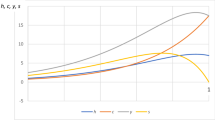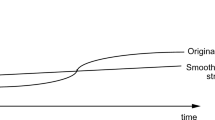Abstract
The overlapping generations model with life-time uncertainty is capable of generating unfamiliar, nonmonotonic adjustment phenomena that are attributed to a transitory savings motive. Slowly falling (increasing) wages create transitory savings (dis-)incentives which vanish in the long run when wage profiles become stationary again. Such a transitory savings component comes on top of a base component created by the permanently operating long-run savings incentives, and it easily gives rise to overshooting adjustment. Assets and consumption may even move first in a direction opposite to the implied long-run changes.
Similar content being viewed by others
References
Blanchard, O. J. (1985): “Debt, Deficits, and Finite Horizons.”Journal of Political Economy 93: 223–247.
Blanchard, O. J., and Fischer, S. (1985):Lectures on Macroeconomics. Cambridge, MA: MIT Press.
Bovenberg, L. A. (1993): “Investment-Promoting Policies in Open Economies: The Importance of Intergenerational and International Distributional Effects.”Journal of Public Economics 51: 3–54.
Buiter, W. H. (1988): “Death, Birth, Productivity Growth and Debt Neutrality.”Economic Journal 98: 279–293.
Frenkel, J. A., and Razin, A. (1987):Fiscal Policies and the World Economy. Cambridge, MA: MIT Press.
Matsuyama, K. (1987): “Current Account Dynamics in a Finite Horizon Model.”Journal of International Economics 23: 299–313.
Weil, P. (1989): “Overlapping Families of Infinitely-Lived Agents.”Journal of Public Economics 38: 183–198.
Author information
Authors and Affiliations
Rights and permissions
About this article
Cite this article
Keuschnigg, C. The vanishing savings motive. Zeitschr. f. Nationalökonomie 60, 189–197 (1994). https://doi.org/10.1007/BF01227866
Received:
Revised:
Issue Date:
DOI: https://doi.org/10.1007/BF01227866




